Engineers Without Borders travels to Rwanda

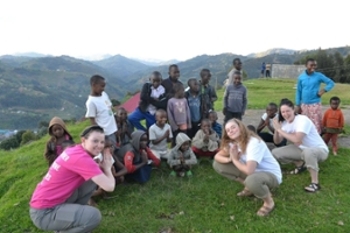 Kylie, Katie, and Kelsea pose with Rwandan
Kylie, Katie, and Kelsea pose with Rwandan
childrenIn May, four Miami University Engineers Without Borders students went to Munini, Rwanda on a quest to improve the living conditions there.
The students were Katie Byrnes, Kylie Hays, Kelsea McGraw, and Colin Atwater. They spent two and a half weeks working with locals to find and implement solutions to the community’s most pressing problems.
Katie Byrnes, the Rwanda Project Manager, first went to Rwanda with Engineers Without Borders (EWB) in May 2016, and she was eager to get back.
“Rwanda is the most beautiful country, anyone who’s talked to me for more than five minutes know how much I love that place,” she said.
But the students weren’t there for fun. They had ambitious goals to improve water quantity and quality and to collect data at a school to design solutions to increase its sanitation and fuel efficiency.
It wasn’t easy.
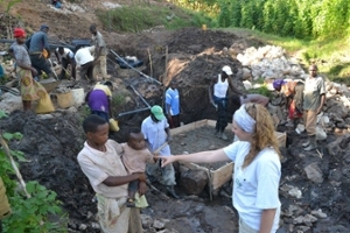 Katie and local workers construct spring box
Katie and local workers construct spring box
water purification system
Providing clean water
The group split into two teams. Katie and Kylie were in charge of building a system to purify the spring water and store it.
From the start the team ran into challenges. They had designed a spring-box system to clean the water, but since they designed it from Ohio they were unprepared for the unique geological challenges that faced them.
For example, they designed the system believing that the spring only had two eyes (an eye is an access point to the spring from the ground’s surface) but it really had three, which required them to modify their design.
“We spent a whole year designing a project,” Kylie said, “and then we got there and everything changed.”
But with some water filters, piping, and a storage tank the team managed to turn the rehabilitation of the spring into a massive success. They successfully created a system that would clean the water and store the extras.
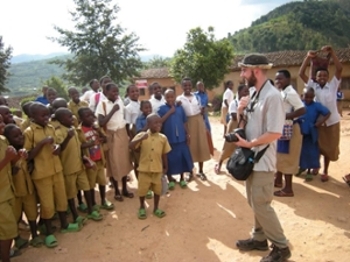 Colin entertains children at the local school
Colin entertains children at the local school
Helping a local school
Colin and Kelsea had to determine solutions for two problems at the local school.
The first problem was sanitation--there were not enough latrines at the school and there wasn’t anywhere for the students to wash their hands. So Colin and Kelsea tested soil to determine where latrines could be built and took measurements in order to design a hand washing station and connect it to a pre-existing water tank.
The other problem was in the school’s kitchen.
Student’s enrollment in school drops dramatically in the village (about 75%) between primary and secondary school, in part because of the added cost to pay for the school-provided lunch.
The lunches are cooked over an open fire, which is inefficient and requires a lot of wood to keep burning. The students determined that a new stove would save the school 70% on its fuel costs, which would bring the cost of lunches down and hopefully more families would be able to afford to keep their kids in school.
Additionally, EWB found that a new building for the school’s kitchen would be immensely beneficial to the community based on feedback from the school, parents, and kitchen workers. This project is being undertaken by a local engineer, but EWB will help raise money for it.
Miami EWB plans to go back to next year to build the latrines and handwashing station and to make improvements to the local clinic.
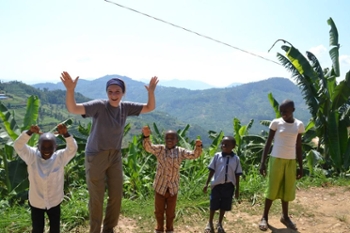 Katie dancing with kids
Katie dancing with kids
Impacting a community
“EWB’s goal is to enable communities with the means to help themselves,” said Colin.
Since EWB’s trip last year, the community added another water tap and are extending the water distribution to another village, as well as building the new kitchen for the school. The students work closely with the local community to tailor solutions to their needs and abilities, and they use local labor and local vendors to produce solutions that are sustainable in the community.
Katie, Kelsea, Kylie and Colin also helped the community in ways that they didn’t expect.
They bonded with the kids at the school. The kids followed the students wherever they went. They loved to test out their English phrases with Americans, and they tried to teach Katie how to dance.
“Depending on the time of day we could either be talking with a few students or completely surrounded by literally hundreds of them,” Colin said.
The EWB students entertained them with pictures and by playing music. Colin also played soccer with them when he got the chance.
But it wasn’t all fun and games. A sobering moment for Colin was when one of the teachers thanked him for distracting the kids from the harsh realities of their lives.
“That really hit home with me. These kids are really unfortunate; most have only two sets of clothes, they're parents are subsistence farmers, they don't get three meals a day, they have to walk a few hundred yards or even a mile up or down a mountain to get water. Most will live in that state for the rest of their life,” Colin said.
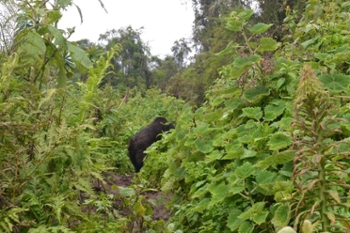 A glimpse of one of the last mountain gorillas
A glimpse of one of the last mountain gorillas
Exploring a dynamic country
Though they worked six days a week from dawn until dusk, they did get opportunities to enjoy the locale.
A highlight of the trip was when they climbed Mount Bisoke, a local volcano. They traveled with armed men, to make sure they were safe from gorillas.
And they did run into a mountain gorilla, although they didn’t need saving from it. There are only an estimated 800 mountain gorillas left in the world, so seeing one in the wild is something they will never forget.
By Paige Smith

